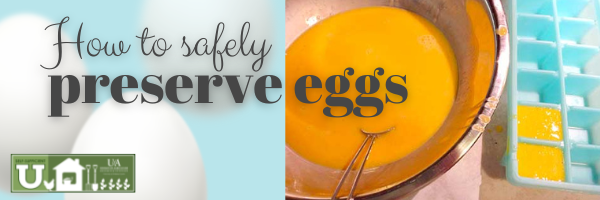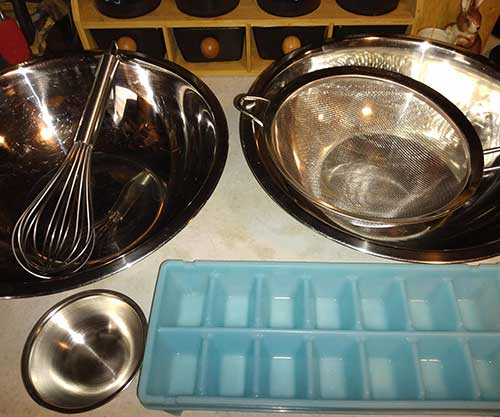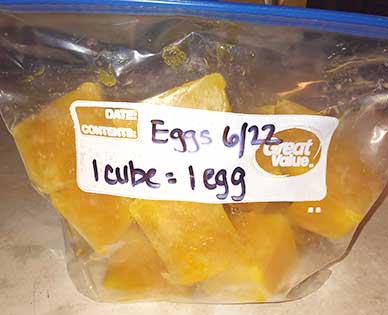Self Sufficient U Blog
Contact
Clark County Extension Service
Amy Simpson, Horticulture
Cindy Ham, 4-H and Ag
JoAnn Vann, Family & Consumer Sciences
Phone: 870-246-2281
Email: clark-arkadelphia@uada.edu
Follow us on
Facebook
Clark County
Cooperative Extension Service
640 S 6th Street Suite B
Arkadelphia, AR 71923

How to Safely Preserve Eggs
JoAnn Vann
Concerned about news stories projecting the cost of eggs going to $12 a dozen or overloaded with fresh farm eggs? Looking for a way to preserve some now while they are plentiful and inexpensive? Look no further!
Freezing unshelled eggs is the way to go! Before we get into the quick and easy steps to freeze eggs, let’s look at two key points on:
Why freezing is the only recommended method for storing eggs long-term
First, eggs are porous allowing oxygen and humidity to move from outside to inside the shell to create the ideal conditions for developing chicks to grow until hatching. Even the “bloom”- that waxy coating on farm eggs that is washed off in commercial egg production- does not stop this process.
For this reason, soaking shelled eggs in any form of water solution is not recommended because potential contamination in the air and water will make their way inside the egg through the shell. Soaking in lime water was a common practice prior to widespread availability of refrigeration, but it is now known that lime (calcium hydroxide) can cause a multitude of issues with short term and prolonged use including severe change in acid level of blood, breathing difficulty, skin irritation, and abdominal pain. This transfer of oxygen and humidity also causes egg quality to decline over time.
Second, eggs are inherently at risk of salmonella contamination. These bacteria can make you seriously sick with symptoms of fever, stomach cramps, diarrhea, nausea, vomiting, and headache beginning 6 hours to 6 days after exposure. Yuck! I certainly do not want any of that!!! Salmonella cannot be seen, smelled, or tasted so safe handling is of upmost importance with poultry products whether store-bought or home grown.
Check out “Salmonella and Eggs” for the details, but summing it up, “chickens and other live poultry can carry

Mixing bowls, a wisk, strainer, and ice cube trays are among the supplies you'll need to freeze eggs.
Salmonella bacteria. These germs can spread from the birds to their eggs. Always handle and cook eggs properly to prevent illness.” Yep, you read that right-not just the outside of the egg, but inside the egg as well! Since the salmonella can be on the inside, it is not recommended to store eggs long-term inside the shell.
Let’s us put science to work for us to safely preserve this excellent protein source!
Key points to freezing eggs are: never freeze in the shell and frozen eggs should be used within 1 year.
What you will need to preserve eggs:
- Dozen eggs- store bought or farm fresh
- Whisk
- Bowl for scrambling
- Cup for cracking each egg
- Ice cube trays or small freezer containers
- Freezer storage containers or freezer safe bags
Get printable link to instructions including freezing yolks and whites separately.
How to safely freeze eggs
- Inspect each egg for cracks. Discard any that show signs of shell weakness as this may have allowed bacteria inside the egg.
- Thoroughly mix yolks and whites. Do not whip in air. To prevent graininess of the yolks, add 1-½ tablespoons sugar, 1-½ tablespoons corn syrup OR ½ teaspoon salt per cup whole eggs, depending on intended use.
- Strain through a sieve or colander to improve uniformity.
- Package, allowing ½-inch headspace.
- Seal and freeze.
 Straining eggs through a sieve or colander improves uniformity.
Straining eggs through a sieve or colander improves uniformity.
Another method of freezing a whole-egg mixture is to use ice trays.
- Measure 3 tablespoons of egg mixture into each compartment of an ice tray.
- Freeze until solid. Remove frozen cubes, and package in moisture-vapor resistant containers.
- Seal and freeze.
- Three tablespoons of the egg mixture (one cube) equal one whole egg.
Growing your own birds and eggs?
Protect yourself and loved ones by following the steps provided in Keeping Backyard Poultry. Take our online backyard poultry course. You can also call your local county agent for more information on food safety and raising healthy livestock.
Locate us at: Arkansas Extension County Offices | Cooperative Extension Offices in Arkansas (uada.edu).
